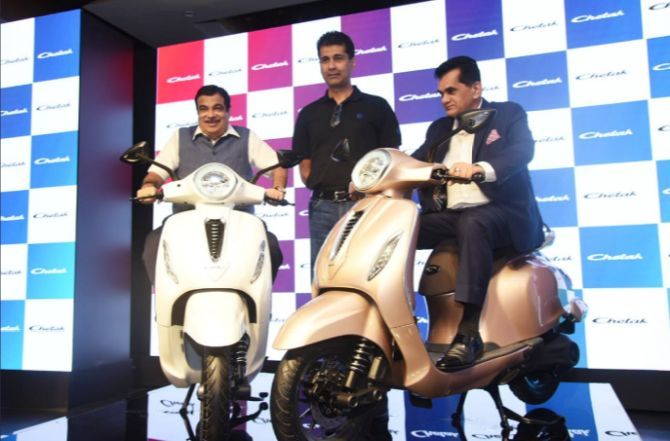In doing so, Bajaj has become the first internal combustion engine two-wheeler company to launch an all-electric two-wheeler in India.

Two months back, Rajiv Bajaj, owner of India’s second largest motorcycle manufacturer, was in a tussle with the government over an aggressive timeline for electrification of the two-wheeler industry.
On Wednesday, in the presence of Road Transport Minister Nitin Gadkari and NITI Aayog CEO Amitabh Kant (NITI Aayog had proposed electrification of two-wheeler industry by 2023), his company launched the first electric two-wheeler from the Bajaj stable.
Through this, it also returned to the scooter segment, which it had exited in 2009.
Aptly, the electric scooter has been named Chetak, which had been a household name in the last decade.
“Our future is in our past,” the managing director at Bajaj Auto said. “The fact that Bajaj doesn’t sell scooters is our bigger strength. We are starting from here because there is no conflict of interest. When you enter into a new market, you don’t make money from Day One. The price will not be viable from Day One, but it will add to our numbers.”
In doing so, Bajaj has become the first internal combustion engine two-wheeler company to launch an all-electric two-wheeler in India.
Hero Motocorp and TVS Motor Company are in different stages of launching and developing such electric two-wheelers. Hero, however, has 35 per cent stake in start-up Ather Energy.
India’s big three two-wheeler firms -- Hero MotoCorp, Bajaj Auto and TVS Motor -- had vehemently opposed NITI Aayog’s plan to push for 100 per cent EVs, saying such a transition could jeopardise the sector.
Bajaj didn’t stop at taking a jibe at his rivals.
“It amazes me to see people who have done nothing suddenly wanting to revolutionise Indian roads. Failed two-wheeler makers, which couldn’t make normal engines work, are making electric vehicles,” he said. “We are a company with a rich past and strength which gives us confidence to foray into EVs.”
However, the scooter, which will be pitched as a premium product, will be initially available in Pune and Bengaluru only from January 2020 and be priced a little more than Rs 1 lakh.
“We want to gauge the response from consumers, see how it works in the limited infrastructure capabilities and then decide on a pan-Indian roll out,” said Rakesh Sharma, executive director at Bajaj Auto.
South Korean Hyundai had also launched the Kona -- a fully electric four-wheeler -- but has warned that unless volume picks up, it will be difficult to manufacture EVs in India. Kona is priced at Rs 25 lakh.
“As volume picks up, the manufacturing cost of EVs will come down,” Sharma said.












 © 2025
© 2025